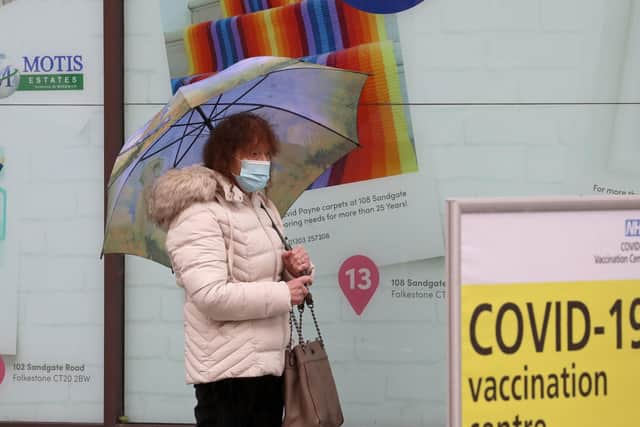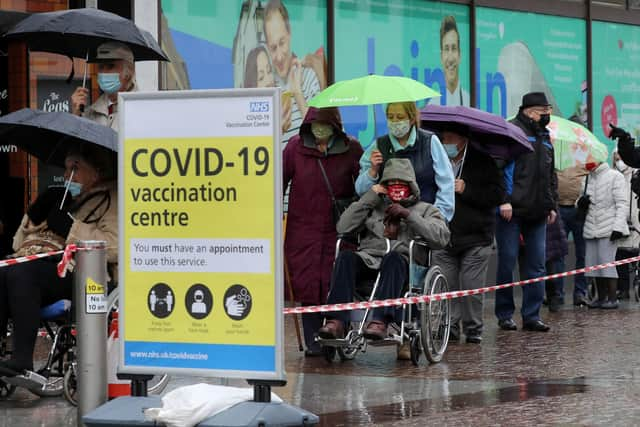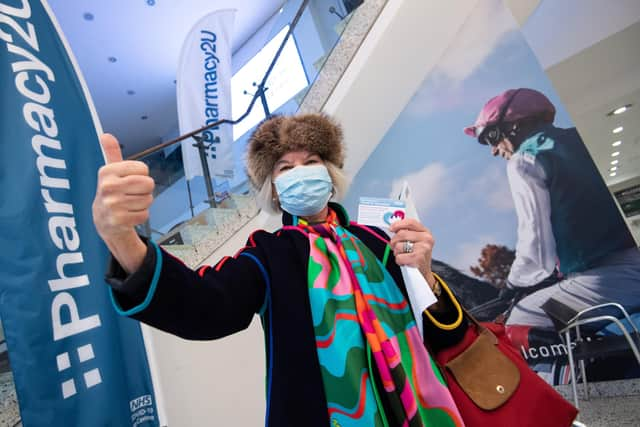Vaccine rollout is British success story – Andrew Vine
He was, of course, talking about his Covid-19 jab, having just received a dose of the Oxford-AstraZeneca vaccine, and he’s right. It is a British success story, and I shared his high spirits about it.
Another thing we shared was a sense of relief that the vaccination programme is going so well, far better than in most other countries, which has been so harshly illustrated by the terrible mess the EU has got itself into as a result of its notoriously sluggish bureaucracy.
Advertisement
Hide AdAdvertisement
Hide AdIt beggars belief that tens of millions of people across Europe have no prospect of receiving a first dose of vaccine for weeks because centralised decision-making moved so slowly that it failed to secure supplies.


There is much to criticise our Government for over its handling of the pandemic and there’s bound to be a damning verdict, whenever there is a proper inquiry, into why we suffered one of the world’s worst death tolls.
But one thing it has unquestionably got right is the decision to manufacture vaccines in Britain, ensuring that we have them immediately to hand. Millions of our relatives and friends are already safer as a result of that decision, and in the months to come it will surely prove a crucial factor in the long trek back towards normality.
A focus of that new normality needs to be on a best of British mentality – that the more self-sufficient we are as a country, and the more willing to act with confidence, the better off and safer we’ll all be.
Advertisement
Hide AdAdvertisement
Hide AdThat doesn’t mean turning our back on other countries, simply a recognition that the pandemic has exposed how potentially vulnerable being so reliant on imports can leave us in an emergency.


Without the huge amounts of money invested over the past year in British research into vaccines, and then the plants to produce them, we could be facing the same plight as France, Germany or Italy, with nowhere near enough to go around.
We’re sprinting ahead with vaccinations while they have barely got away from the starting-blocks, because the Government essentially placed a series of very large bets last year.
It bet on the successful outcome of research-and-development of potential vaccines by getting pre-orders in, and then bet again on the benefits of having plants to produce them.
Advertisement
Hide AdAdvertisement
Hide AdBoth were winners. The result is that for the first time since this pandemic engulfed us, and despite the many mistakes made, it finally feels as if the Government, rather than Covid-19, is dictating the course of events.


The benefits of British self-sufficiency can also be seen in the provision of essential personal protective equipment.
During the first wave, a key factor in critical shortages was that Britain imported 99 per cent of it, and struggled to source supplies. When a full inquiry is finally held, it may well conclude those shortages resulted in at least some of the hundreds of tragic deaths amongst NHS and care home staff.
Now, we produce about two-thirds of all the PPE used and there has been no shortage in the second wave, hopefully saving the lives of doctors, nurses and carers.
Advertisement
Hide AdAdvertisement
Hide AdThe lessons learned about building reliable sources of supply when it comes to dealing with Covid could also prove useful for other areas of national life, whether they be food production or the green economy, such as making electric vehicles and the batteries to power them.
What Europe’s problems in getting vaccines or PPE have demonstrated is that international chains of supply can prove shockingly fragile, especially in a crisis.
Hand-in-hand with producing more at home must go a greater emphasis on long-term preparedness. Long-established Government plans to deal with a flu epidemic proved unequal to the challenges presented by coronavirus.
Look to the Far East, and there are lessons to be learned about preparedness from Taiwan and South Korea, both of which got away relatively unscathed by Covid, thanks to all they learned from dealing with the 2003 outbreak of Sars.
Advertisement
Hide AdAdvertisement
Hide AdAs the shadow of this terrible episode hopefully begins to fade, the Government needs to place emphasis on developing British self-sufficiency and the increased resilience to emergencies that goes with it. Part of that is ensuring that we are never again caught on the hop by an illness emerging somewhere in the world with the potential to kill vast numbers of Britons.
That means appointing a minister for global health security and a standing committee to remain vigilant and constantly update preparedness.
It won’t come cheap, but as the investment in vaccine manufacture has proved, it will be worth every penny.
Support The Yorkshire Post and become a subscriber today. Your subscription will help us to continue to bring quality news to the people of Yorkshire. In return, you’ll see fewer ads on site, get free access to our app and receive exclusive members-only offers. Click here to subscribe.
Comment Guidelines
National World encourages reader discussion on our stories. User feedback, insights and back-and-forth exchanges add a rich layer of context to reporting. Please review our Community Guidelines before commenting.